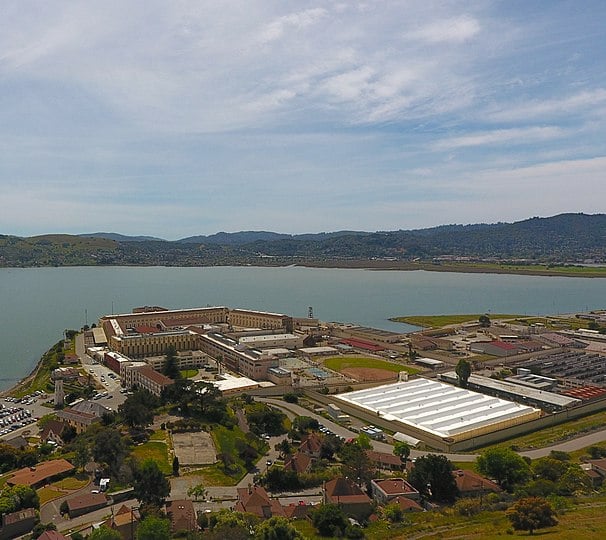Content warning: state violence, COVID-19, death
A prison sentence during a COVID-19 outbreak is a death sentence. The conditions that exist within prisons, jails and detention centers —overcrowding, lack of sanitation and high populations of elderly and immunocompromised people — make already devastating COVID-19 outbreaks worse. And just as experts feared, just 50 miles north of Stanford, the third largest outbreak in the nation has erupted in San Quentin State Prison, with over one-third of the incarcerated population testing positive for COVID-19.
This is a crisis — a crisis reflective of anti-Blackness and medical racism; a crisis of public health and safety; and a crisis of human rights. Worst of all, this COVID-19 outbreak at San Quentin is a crisis that was completely preventable.
San Quentin’s outbreak can be traced to May 30th when the California Department of Corrections and Rehabilitation (CDCR) negligently transferred 121 men from California Institute for Men, a known COVID-19 hotspot, to San Quentin. While everyone who transferred had previously tested negative for COVID-19 (in many cases their tests were conducted 2-4 weeks before the transfer), none of the transfers were tested upon arrival. On May 30th, San Quentin had 0 confirmed cases. Today, just over a month later, it has more than 1400 confirmed cases, a likely underestimate since there has been no comprehensive testing available.
At San Quentin, we see once again how government negligence results in violence inflicted upon Black lives. To be clear, the state government’s actions have put thousands of people’s lives in mortal danger. Approximately 1400 of the people incarcerated at San Quentin have at least one COVID-19 risk factor. 300 of them have four or more COVID-19 risk factors. The antiquated state facilities built nearly two centuries ago, poor ventilation, lack of essential cleaning and hygiene supplies, and overcrowding at San Quentin (some blocks already nearing 200% capacity) make it virtually impossible to properly control the outbreak and protect people’s lives. James King, a formerly incarcerated community leader and now State Campaigner at Ella Baker Center, stated that “the quality of life in San Quentin has never been worse, certainly in the last 100 years.”
This failure of the state government will also be felt outside of the prison system. Faculty from UCSF and UC Berkeley’s School of Public Health, who toured the San Quentin facilities in June, are warning that a failure to control this outbreak immediately could easily flood and overwhelm San Quentin and even Bay Area hospitals. With every passing moment, the crisis only grows more serious. Governor Gavin Newsom and the CDCR need to take immediate action to protect their lives.
Therefore as the ASSU Executives, we stand in solidarity with the organizers of #StopSanQuentinOutbreak; Ella Baker Center for Human Rights, Restore Justice, Asian Prisoner Support Committee – APSC, the Incarcerated Community of San Quentin, Stanford’s Prison Renaissance Project and the many loved ones of those inside San Quentin. We endorse their demands and demand the following:
- We demand that Governor Newsom and the CDCR take immediate action by granting releases without categorical exclusions to reduce the California prison population, stop all future prison and ICE transfers to reduce the rate of transmission and provide immediate testing to all people who are incarcerated and prison staff. These steps have all been recommended by UCSF and UC Berkeley School of Public Health.
- We join the organizers of #StopSanQuentinOutbreak in calling for Governor Gavin Newsom to tour San Quentin Prison this Thursday, July 9th at noon. Organizers, family and friends of people who are incarcerated, academics, and lawmakers will be waiting at the main gate of San Quentin for the Governor to show up. Governor Newsom has visited the site of many disasters in the past for a first-hand perspective, but has not yet visited San Quentin.
Along with our statement of solidarity, we also call upon willing and able members of the Stanford community to speak up about this crisis in the following ways:
Admin and Faculty
- Endorse and support the urgent memo published by faculty from UCSF and UC Berkeley who toured the San Quentin State Prison facilities and have recommended urgent public health measures to safeguard lives.
- Sign on to this open letter to Governor Newsom authored by criminal justice and prison scholars by emailing [email protected]
Students, Alumni and Community Members
- Read the recently launched zine from the Project Renaissance Project at Stanford, featuring a collection of artwork and poetry created by 5 artists incarcerated at San Quentin State Prison during the COVID-19 pandemic
- Use this media toolkit to spread the #StopSanQuentinOutbreak Campaign on social media
- Donate to www.restorecal.org, one of the organizations coordinating the #StopSanQuentinOutbreak campaign and currently providing material needs for people who are incarcerated inside San Quentin. Please also consider matching donations to this cause by emailing [email protected].
- Sign-up to call upon and email California state officials to prioritize and address the outbreak at San Quentin
We firmly believe that it is our moral responsibility to use our positions to advocate for an end to this human rights and public health crisis. As students, alumni, faculty, and administrators of Stanford,’ we must individually and collectively take action and call upon our government to secure the health, safety, and human rights of those incarcerated in our prison system.
Signed,
Munira Alimire ’22, ASSU President 2020-2021
Vianna Vo ’21, (she/her), ASSU Vice President 2020-2021
Jianna So ’21, (she/her), ASSU Chief of Staff 2020-2021
Will Shan ’22, (he/him), ASSU Co-Director of COVID-19 Response 2020-2021
Adonis Rubio ’21, (he/him), ASSU Co-Director of COVID-19 Response 2020-2021
